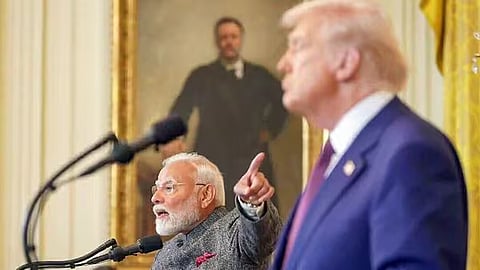

Personal tensions between Prime Minister Narendra Modi and US President Donald Trump, sparked by a clash over Trump’s claim of having ended the India-Pakistan fight and his bid for a Nobel Peace Prize, played a decisive role in Washington’s decision to slap steep 50 percent tariffs on Indian exports, according to The New York Times.
The friction dates back to a June 17 phone call in which Trump asked Modi to support his Nobel nomination, claiming credit for ending hostilities between India and Pakistan after the May 7 Pahalgam terror attack. Modi rejected the claim, insisting the ceasefire was reached bilaterally without US involvement.
The rebuff soured relations, with Modi reportedly refusing to take Trump’s subsequent calls. Analysts say the breakdown in personal ties fed directly into Washington’s punitive tariff decisions.
During a phone call on June 17, Trump said “how proud he was of ending the military escalation” and “mentioned that Pakistan was going to nominate him for the Nobel Peace Prize”, the Times reported, citing interviews with unnamed people in New Delhi and Washington. “The not-so-subtle implication, according to people familiar with the call, was that Modi should do the same,” the report said.
Modi reportedly told Trump that US involvement “had nothing to do with the recent ceasefire”, and that matters had been “settled directly between India and Pakistan”.
Amid trade tensions between Delhi and Washington, the NYT article gives an account of how relations between Trump and Modi “unravelled” after Trump’s repeated claims of solving the four-day conflict in May between India and Pakistan, an assertion denied by India.
“President Trump’s repeated claims about having 'solved' the India-Pakistan war infuriated Prime Minister Narendra Modi. And that was only the beginning,” the NYT article said, adding that Modi was “losing patience” with Trump.
NYT reported, “Trump largely brushed off Modi’s comments, but the disagreement – and Modi’s refusal to engage on the Nobel – has played an outsize role in the souring relationship between the two leaders, whose once-close ties go back to Trump’s first term.”
The NYT noted that the White House did not acknowledge the June 17 call, nor did Trump post about it on his social media accounts. Trump has repeated his claim of stopping the conflict between India and Pakistan over 40 times since May 10.
“And it is also the tale of an American president with his eye on a Nobel Prize, running smack into the immovable third rail of Indian politics: the conflict with Pakistan,” it said.
The report added that as Trump imposed additional tariffs of 25 percent on India for its purchases of Russian oil, “the colossal penalties on India in particular appear to be punishment for not falling in line rather than any kind of cohesive effort to reduce the trade deficit or cut off funding for” Putin’s war.
The NYT article quoted Richard Rossow of the Centre for Strategic and International Studies as saying that it was “about more than just Russia.”
“If this was a real change in policy in trying to squeeze Russia, Trump could have put his weight behind legislation that would have imposed secondary sanctions on countries that buy Russian hydrocarbons. The fact that they have uniquely targeted India says this is about more than just Russia,” Rossow was quoted as saying.
The NYT article further said that Trump, “frustrated by the tariff negotiations”, reached out to Modi several times, but the the latter “did not respond to those requests.”
Trump “no longer has plans” to visit India later this year for the Quad Summit, The New York Times claimed on Saturday, as it detailed how relations between the American leader and Prime Minister Narendra Modi “unravelled” over the last few months.
The Trump administration hosted the Quad Foreign Ministers’ Meeting in January this year, a day after Trump took the oath of office as president for a second term in the White House.
India has condemned the newly imposed US tariffs as unfair and unjustified, asserting that the government will not compromise the interests of its farmers and livestock sector.
On the US tariff impacts, Union Commerce and Industry Minister Piyush Goyal said the move by President Donald Trump's administration should not deter us and asked all to pull up their socks. The US has imposed a 50 per cent tariff on Indian goods, impacting sectors such as textiles and apparel, gems and jewellery, shrimp, leather, and others.
(By arrangement with livemint.com)